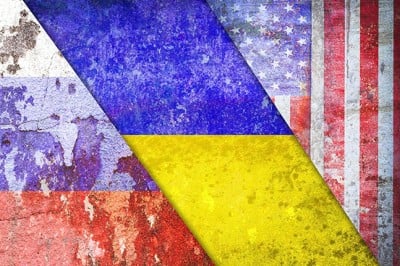US-backed Rightists Attack Russian Embassy in Kiev

Hundreds of right-wing demonstrators attacked the Russian embassy in Kiev on Saturday, hurling petrol bombs, eggs and paint, smashing windows, tearing down Russian flags and overturning cars attached to the embassy. Police stood by as the mob laid siege to the building.
Acting Ukrainian Foreign Minister Andriy Deshchytsia joined the attack, telling the protesters: “I am for you protesting. I am ready to be here with you and say ‘Russia get out of Ukraine’… Putin is a khuilo [fucker].”
The violent provocation followed the shooting down by anti-regime protesters in eastern Ukraine of a Ukrainian military transport flying troops into Luhansk. All 40 soldiers and 9 crewmembers aboard the transport died.
The dispatch of the transport was part of an escalation of government violence, utilizing tanks and military planes, against protesters and pro-Russian militias hostile to the US- and German-orchestrated putsch, spearheaded by fascist forces, which installed the current pro-Western regime in Kiev.
The United States and its European allies issued perfunctory statements denouncing the attack on the embassy, a blatant violation of international law. However, they signaled their support for the anti-Russian provocation by blocking a resolution submitted by Moscow to the United Nations Security Council condemning the assault and the Kiev regime’s support for it.
US Secretary of State John Kerry called Ukrainian Prime Minister Arseniy Yatsenuk Saturday not to reprimand him for the right-wing attack on the Russian embassy, but to express his condolences for the 49 Ukrainian forces lost in the shoot-down of the plane and reiterate “the commitment of the United States and G7 partners to raise the costs for Russia if it does not end the flow of weapons across the border and break with separatists.”
Kerry also called Russian Foreign Minister Sergei Lavrov to voice his “concern” over the downing of the plane and demand that Russia end “the flow of weapons and support to separatists.”
The attack on the embassy was designed to inflame international tensions and move the Ukrainian crisis towards war between Russia and the major Western powers. By tacitly backing the attack, the NATO powers are essentially giving a blank check to the Kiev regime for action against Russia.
Russian officials have responded by warning that the Western powers risk dragging Russia, a nuclear-armed country, into a war.
Russian Ambassador to Ukraine Mikhail Zurabov said the attackers included two groups of “well equipped” youth who were “ready to storm” the embassy. “They had baseball bats, metal rods, axes. Had they entered the territory of the embassy, I think we would not have avoided victims,” he said.
Russian Foreign Minister Lavrov told journalists, “From our diplomats’ point of view, the aim of the attackers was to physically seize the embassy building. There are also grounds to believe that they wanted bloodshed.” Lavrov went on to say that the main forces involved in the attack were “fighters from Azov Battalion, created and financed by oligarch Igor Kolomoisky,” whom Kiev appointed as governor of Dnepropetrovsk in the south-central part of the country.
Two months ago, the leader of the fascist Right Sector, which supplied the bulk of the armed personnel who led the February 22 overthrow of the elected president, Victor Yanukovych, and installation of the anti-Russian coup regime, moved his headquarters to Dnepropetrovsk.
Russian legislator Aleksey Pushkov, the head of the Russian parliament’s foreign affairs committee, called on acting Ukrainian President Oleksandr Turchynov to fire acting Foreign Minister Deshchytsia, saying, “I can’t really imagine how anyone, especially a Russian representative, can sit down at the negotiating table with him after such an outburst.”
In a post on Twitter, Pushkov wrote that Ukrainian officials in Kiev “are trying to pull us into a war.”
US Ambassador to Ukraine Geoffrey Pyatt provocatively responded by calling Deshchytsia “a skilled diplomat and credit to Ukraine.”
Over the weekend, NATO and Russia traded accusations that Russian and Ukrainian tanks were violating the Ukrainian-Russian border. While NATO Secretary General Anders Fogh Rasmussen accused Russian tanks of crossing the border in “a serious escalation of the crisis in eastern Ukraine,” Russian officials blamed Ukrainian tanks for invading Russia. The Russian Foreign Ministry warned that if Ukrainian incursions continued, Moscow would “take all necessary measures to suppress them.”
Meanwhile, the humanitarian crisis in eastern Ukrainian cities attacked or besieged by Kiev regime forces continues to mount. Tens of thousands of people are leaving the rebel-held city of Slavyansk, which Kiev regime forces have shelled almost daily. The city no longer has water, utilities or food.
Valentina Vasiliyevna, a pensioner in Slavyansk whose apartment was hit by a shell last week, compared the fighting in her city to that during World War II in an interview with the British Guardian. “I lived through the Great War, and now we’re living through another one,” she said.

